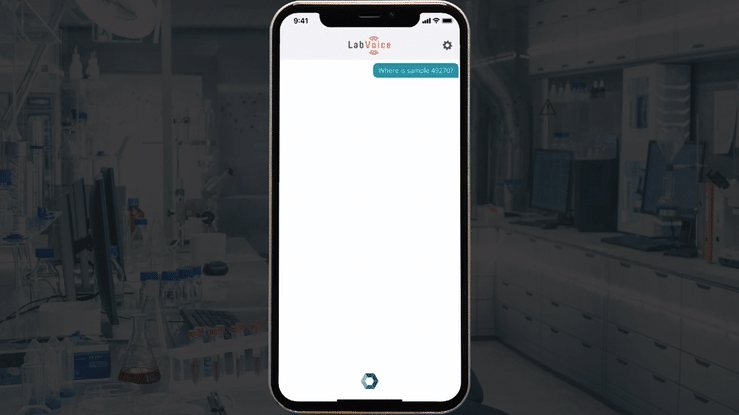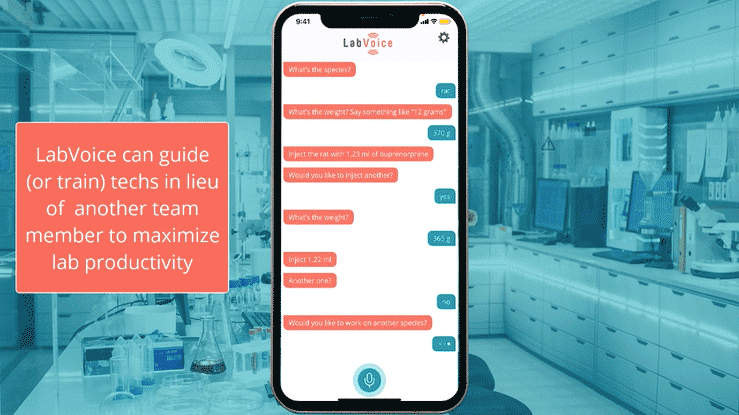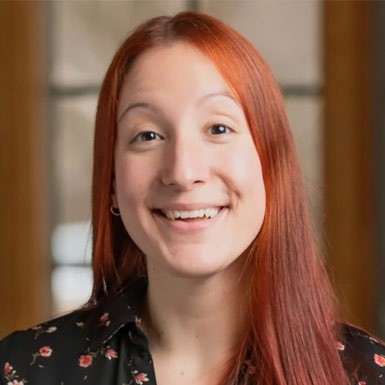Como estava esse conteúdo?
- Aprenda
- Como o LabVoice e a AWS estão expandindo a acessibilidade nos laboratórios de pesquisa
Como o LabVoice e a AWS estão expandindo a acessibilidade nos laboratórios de pesquisa
Como estudante de doutorado em biofísica em Yale, Sara Siwiecki passa muito tempo no laboratório trabalhando em pequenos detalhes, como examinar um microscópio ou gerenciar inventários dos produtos químicos de que precisa para experimentos. Mas ela geralmente encontra obstáculos devido a projetos desatualizados de laboratórios e equipamentos que não atendem à sua deficiência visual. Recipientes opacos que dificultam a leitura das medidas, a desorganização geral de todo o laboratório e o texto pequeno são apenas alguns dos desafios que ela enfrenta durante um dia normal.
Na Brown, o estudante de doutorado Gabriel Monteiro da Silva passou horas rastreando substâncias no laboratório. É um trabalho rotineiro, mas crucial: os produtos químicos de laboratório podem ser caros e, se durarem após a data de validade, podem se tornar riscos à segurança. Manter o controle de dezenas de compostos se torna especialmente estressante devido ao design de laboratório que não explica o transtorno de déficit de atenção/hiperatividade (TDAH) de Gabriel.
Embora suas experiências pessoais no laboratório tenham sido diferentes, tanto Sara quanto Gabriel chegaram à mesma conclusão: laboratórios de pesquisa estão seriamente carentes quando se trata de acessibilidade. É um problema generalizado que não se limita a uma instituição ou tipo de deficiência.
É por isso que eles decidiram colaborar com o LabVoice, uma plataforma digital de assistente de laboratório projetada especificamente para o laboratório de pesquisa. Trabalhando em conjunto com a equipe do LabVoice, eles desenvolveram uma solução de pesquisa de inventário que permite aos usuários registrar informações, como localização e quantidade de produtos químicos, e depois recuperá-las inteiramente por meio de instruções verbais. Em vez de procurar tubos de ensaio e vasculhar gavetas, os cientistas podem perguntar ao LabVoice sobre uma substância e obter instantaneamente as informações de que precisam. Isso pode aliviar os principais fatores de estresse relacionados à falta de acomodações para mobilidade, memória, visão ou outros tipos de deficiências.
Simplificando o trabalho de laboratório para que os cientistas façam seu melhor trabalho
“Achei que o LabVoice era um conceito muito legal”, diz Sara. “É algo muito útil e não foi necessariamente projetado no contexto da acessibilidade, mas é superaplicável à acessibilidade, que é a situação ideal que a maioria das pessoas com deficiência deseja: algo que seja útil para todos e também aplicável e útil para pessoas com deficiência.”
A pesquisa de laboratório também costuma exigir quantidades significativas de trabalho repetitivo e não científico. Alguns estudos sugerem que até 50% do tempo dos pesquisadores é gasto em tarefas administrativas. Isso pode incluir coisas como preparar dados para ingestão e preparar relatórios sobre trabalhos já concluídos, todas as tarefas que podem ser simplificadas com o LabVoice.

O mais importante, porém, é o tempo perdido e as frustrações decorrentes da realidade de ambientes de laboratório inacessíveis. Devido a vários fatores (como falta de financiamento), muitos laboratórios não estão equipados com acomodações atualizadas e não levam em conta a diversidade de experiências com deficiência.
“Existem laboratórios que existem há 60 a 70 anos sem nenhum acréscimo à acessibilidade que vimos em shoppings, consultórios médicos e prédios”, diz Gabriel. “Como a academia é tão isolada e as pessoas que fazem esse tipo de atualização, elas não consideram isso uma prioridade ou, mesmo que o façam, geralmente não recebem financiamento adequado para isso.”
Isso exige que os cientistas trabalhem regularmente em espaços que não foram projetados para suas necessidades. Ao trazer um assistente de voz de IA abrangente para esses ambientes, o LabVoice faz avanços significativos em termos de acessibilidade nas ciências da pesquisa. Ele capacita os cientistas a se concentrarem em suas pesquisas e não nas lacunas de acessibilidade, nas tarefas rotineiras e nas tarefas administrativas.
O Amazon Lex e o Amazon Polly ajudam a oferecer uma experiência completa de assistente de laboratório digital
O LabVoice está disponível como um dispositivo inteligente e uma aplicação móvel. O assistente digital funciona de forma semelhante a um alto-falante inteligente (imagine o Amazon Echo para cientistas) e pode facilitar a tomada de notas e os dados em todo o laboratório. Ele também oferece recursos como a opção de tirar fotos, gravar vídeos e escanear códigos de barras, além de orientar o usuário por processos científicos (procedimentos operacionais padrão (SOPs), protocolos, listas de verificação etc.). O LabVoice se conecta a softwares e equipamentos de laboratório existentes, permitindo que os cientistas usem instrumentos e registrem dados sem usar as mãos. Sua facilidade de uso e conectividade com a infraestrutura do laboratório podem melhorar a conformidade com os protocolos regulatórios e de segurança. E é excelente para a acessibilidade.

Tudo isso é possível graças à integração do LabVoice com a AWS. De acordo com Steve McCoy, diretor de vendas da LabVoice, a implementação dos serviços da AWS pela LabVoice vai além do armazenamento e da computação em nuvem — a plataforma da AWS é fundamental para as operações da LabVoice.
Em particular, o LabVoice conta com o serviço de inteligência artificial conversacional Amazon Lex e o software de conversão de texto em fala Amazon Polly para oferecer uma experiência completa de assistente de laboratório digital. Steve explica que a equipe usa essas ferramentas como base para desenvolver adições e extensões que são científicas específicas.
O amplo conjunto de dados da AWS também permite que a equipe refine continuamente a experiência do LabVoice. “Ao usar a AWS como a espinha dorsal do que estamos fazendo, podemos acessar grupos de milhões e milhões de [usuários] desses produtos”, diz Steve. Isso dá à equipe do LabVoice uma amostra enorme de vozes e sons vocais para usar enquanto trabalha para melhorar os recursos de reconhecimento de voz da plataforma. Esses dados são essenciais para melhorar a capacidade do LabVoice de identificar termos que são encontrados regularmente no laboratório, mas que podem ser incomuns em outros lugares, como compostos químicos ou dispositivos científicos.
Steve acredita que o futuro do LabVoice+ AWS é uma experiência perfeita que captura a totalidade do fluxo de consciência de um cientista enquanto ele trabalha. À medida que a tecnologia continua se desenvolvendo, um pesquisador pode “falar em tempo real com suas observações, anotações, medições e, em seguida, usar o que a AWS oferece para transformar isso em algo que é inserido automaticamente em seu caderno eletrônico de laboratório”.
Esses desenvolvimentos seriam impactantes para o trabalho diário de muitos pesquisadores em laboratórios que carecem de acomodações adequadas. “Obviamente, a academia é o que milhões de pessoas fazem apenas nos EUA”, diz Gabriel, então os problemas de acessibilidade no laboratório afetam muito mais do que “apenas um nicho de pessoas”.
“Olhando para o futuro da ciência em geral, acho que as coisas poderiam ser significativamente melhoradas e facilitar a vida de todos implementando coisas como o LabVoice”, diz Sara. “Há uma infinidade de oportunidades que podem surgir disso.”
A tecnologia pode ajudar trabalhadores em uma ampla variedade de campos, da agricultura à biologia marinha. Seja qual for o setor, o LabVoice será um ativo para permitir que pessoas como Sara, Gabriel e seus colegas continuem trabalhando nas soluções do futuro.

Megan Crowley
Megan Crowley é Redatora Técnica Sênior na equipe de Conteúdo de Startups da AWS. Com uma carreira anterior como professora de inglês no ensino médio, ela é movida por um entusiasmo implacável por contribuir com conteúdo que seja ao mesmo tempo educativo e inspirador. Compartilhar histórias de Startups com o mundo é a parte mais gratificante de sua função na AWS. Em seu tempo livre, Megan pode ser encontrada trabalhando madeira, no jardim e em mercados de antiguidades.
Como estava esse conteúdo?